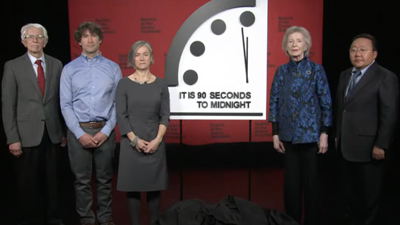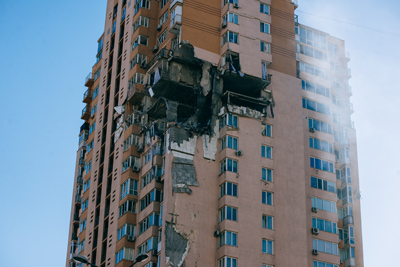This is the third in a series of articles published by the Global Governance Forum addressing many of the issues raised in “A Breakthrough for People and Planet: Effective and Inclusive Global Governance for Today and the Future,” by the High-Level Advisory Board on Effective Multilateralism (HLAB) appointed by the UN Secretary General. The first article focused on the themes of poverty, inequality and global finance. The second article commented on the subjects of global environmental governance and gender equality. This article will elaborate on several of the questions raised by the HLAB report in respect of peace, disarmament and collective security.
Disarmament and collective security
Disarmament for sustainable development and a more secure world should be a self-evident global public good in our complex, interconnected world. Diseases such as HIV/AIDS and, most recently, the COVID-19 pandemic demonstrate that neither militarized borders nor nuclear stockpiles nor bloated military budgets can ensure security in the modern world. As the world continued to reel from the impacts of the COVID-19 pandemic in 2021, world military expenditures exceeded $2 trillion for the first time. In the US (the world leader in military spending) for example, half of the nation’s discretionary budget is allocated to defense. Areas more directly germane to the well-being of its citizens – such as education, healthcare, housing, infrastructure, to name a few – suffer as a result. And this is a global problem; the social and economic opportunity costs of the absence of effective mechanisms of collective security are huge. In particular, they lead the UN’s 193 members propping up their military establishments at a time when, according to the World Bank, 47 percent of the world’s population lives on less than $6.85/day, a poverty line that leaves people “struggling” to fulfill their basic needs.
It has long been recognized that achievement of the UN’s Sustainable Development Goals is inextricably linked to nuclear disarmament because nuclear war moots all questions regarding human security and life on this planet. However, the UN has to date failed in its foundational mandate to divert resources away from weapons and toward the establishment of global peace and security. This failure did not come because the task was impossible, rather it occurred because the countries which won World War II had no interest in disarming. Early hopes for a “peace dividend” at the end of the Cold War and the collapse of the Soviet Union, have in recent years given rise to renewed arms races and open talk of future wars, as a permanent member of the Security Council pursues an unprovoked war of territorial conquest.
The permanent members of the Security Council have instead engaged in weapons profiteering and arms races. Instead of moving toward nuclear disarmament, these weapons that can destroy us all are being “modernized” while new weapons and other methods of death and destruction continue to be developed and used. In its 2022 nuclear year in review, the Bulletin of the Atomic Scientists’ declared that the global nuclear order was “in shambles.” And in January 2023 their Doomsday Clock moved to 90 seconds before midnight, “the closest humanity has ever been to Armageddon.”

Instead of determined multilateral cooperation and action to ensure safety and security for all, geopolitical terms are still being dictated by an anachronistic national security state system which focuses on the ability of a government to defend the apparatus and power of the state itself, rather than prioritizing meeting core needs that dignify people’s lives and allow them to live free from want and free from fear. And free from the catastrophic consequences of climate change, pollution, biodiversity loss, transnational organized crime and corruption and widening income disparities.
The Summit of the Future would be an excellent opportunity to recommit to a world free of nuclear weapons and to a concept of collective security that gives operational meaning to many of the unfulfilled promises of the UN Charter.
National security should be about human wellbeing
Thinking beyond weapons, war and violence to imagine a different kind of world and to work toward creating a world of sustainable development and enduring peace is a challenge. Meeting that challenge requires a different way of thinking about what makes us all secure. The concept of human security, which equates security with people rather than territorial boundaries and with development rather than arms, may be up to the task. When asked what would make people feel secure in today’s world, most would not answer weapons, war, or gargantuan military budgets. Some of the fundamental elements to address human security needs include meaningful work with living wages, access to education for all, decent housing, and good health care, including better protections against the next global pandemic. During the period 2020-2022 the United States suffered more than 1 million fatalities because of the pandemic, more deaths than in both world wars and the Korea and Vietnam wars put together.
In contrast to — and because of — the failure of the UN’s official disarmament bodies, civil society-led disarmament and arms control campaigns have demonstrated that shifting the focus from a national security framework toward one based on human security is possible. The International Campaign to Ban Landmines (ICBL) was the first such effort and its ripple effect has been significant. The effort to prohibit landmines grew from an NGO campaign into a ban movement that included governments, UN agencies, the Red Cross, and other international organizations. The cooperation and joint efforts of the movement’s various partners were — and remain — the key to the Mine Ban Treaty’s success.

Movements that have since followed a similar path include the Campaign to Stop Killer Robots, which is currently seeking to ban lethal autonomous weapons. Other examples include a coalition of NGOs whose decade-long efforts to address the horrific issue of the use of explosive weapons in populated areas — the leading cause of civilian casualties in armed conflict — culminated in a 2022 declaration endorsed by 82 countries. Another such coalition was the International Campaign to Abolish Nuclear Weapons, which championed the most comprehensive nuclear ban treaty to date. Unfortunately, no nuclear-armed nation or host country has had the courage to join the treaty. To illustrate the challenges and cognitive dissonance disarmament movements often face, French diplomats have justified their non-signatory status by publicly stating that France will never give up its nukes because if it were to do so, no country would pay any attention to it – a highly questionable and appallingly cynical reason to hold on to nuclear weapons.
The HLAB report breaks new ground in important ways. Its call to announce a Charter Review conference during the Summit of the Future is an initiative very much supporting. There is no need for such a Review conference to be focused only on Security Council reform, however urgent that project is. The multitude of crises we confront, the solutions to which will require much stronger forms of international cooperation, suggest that the Summit of the Future should be used as a unique opportunity to rethink major elements of our global order at a time of looming catastrophic risks to our future.
WRITTEN BY JODY WILLIAMS AND AUGUSTO LOPEZ-CLAROS
